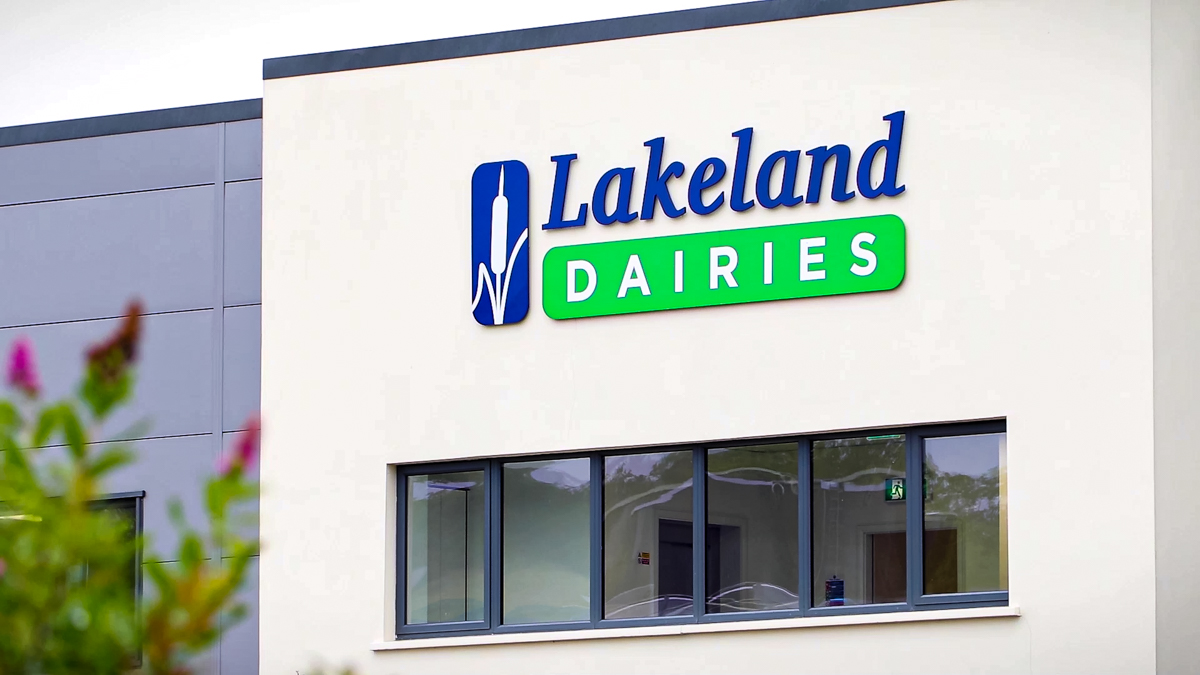Cross-border dairy co-operative Lakeland Dairies’ revenue increased by over 5.7% to hit €1.09 billion in 2020, up by €59.3 million on the prior year figure of €1.03 billion.
Lakeland has today (Wednesday, April 14) announced its results for the year ending December 26, 2020, with increased revenues and operating profit.
In 2019, its revenue hit €1 billion for the first time.
Its increased revenue is across its four operating divisions of Food Ingredients; Foodservice; Consumer Foods; and Agribusiness.
This yielded an operating profit of €26 million, up by €5.6 million (27%) and EBITDA (earnings before interest, taxation, depreciation and amortisation) of €50.5 million, which increased by €7.6 million.
Lakeland Dairies closed the year with a “further strengthened balance sheet” including shareholders’ funds of €207.7 million.
Lakeland operating divisions
Food Ingredients, the largest milk handling part of the business, had an 18% increased revenue to €691 million, based on “consistently strong demand for the co-operative’s functional and enriched powders, proteins and dairy fats throughout the year”.
Lakeland produced over 250,000t of powders and butter in 2020.
Foodservice revenues of €181.7 million came in “higher than expected in a very challenging year”, retracting by 24% on the prior year, given the “exceptionally difficult market conditions experienced by this sector as a result of the pandemic”.
Consumer Foods had a “buoyant year in line with an uplift in overall grocery market growth levels”, with revenues of €145.9 million.
Lakeland Agri increased revenues by 4.7% to €75.8 million for the year, based on a “strong performance with feed sale volumes of 220,000t [an increase of just over 4.7%] and fertiliser sales steady at 27,000t, similar to the prior year”.
Serious market uncertainties
Lakeland Dairies chief executive Michael Hanley said the results “are very positive given the global events of 2020”.
“Notwithstanding the major operational, logistical and commercial constraints of the pandemic, both domestically and globally, we continued to make strong progress across all of our operations and this has yielded excellent results,” Hanley said.
“Aligned to our business achievements, we further consolidated the benefits of the Lakeland LacPatrick merger of 2019, achieving ongoing organisational, operational and administrative efficiencies and contributing to overall economies of scale, value creation and long-term sustainability for our 3,200 milk producers, north and south.
“This robust performance enabled us to pay a competitive milk price in spite of serious market uncertainties that existed throughout the year.
“Market returns depend on the dynamic of milk supply and demand that exists between countries, geographies and continents, also including seasonality and ‘force majeure’ issues such as the pandemic.
“We expect relatively stable dairy market conditions through 2021 albeit there are still significant challenges in our operating environment as we await the anticipated beneficial effect of worldwide vaccine initiatives.”
‘Steer our course through choppy waters’
Lakeland Dairies chairman, Niall Matthews, added that the global nature of world trade “continues to require scale and efficiency in meeting market demands”.
“On one hand, we are always influenced by global socioeconomic considerations; on the other, we have achieved the economies of scale to enable us to be flexible and to successfully steer our course through often choppy waters,” he said.
“Our annual report demonstrates resilience and adaptability which is reassuring for our 3,200 farm families, as primary producers, in terms of the sustainability that we require to underpin the current and future success of our dairy farming.”
The farmer-owned processing co-op collects 1.9 billion litres of milk from 3,200 farm families across 16 counties in Northern Ireland and the Republic of Ireland. It has a portfolio of 240 different dairy products made on eight processing sites, which it exports to over 80 countries worldwide.
